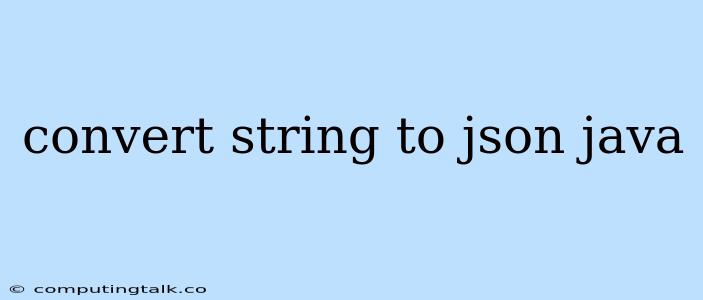In Java, you often encounter situations where you need to manipulate data in JSON format. One common task is converting a string to JSON. This process involves parsing the string, which is a sequence of characters, and transforming it into a structured JSON object that can be easily accessed and manipulated. Let's delve into how to achieve this conversion in Java.
Understanding the Fundamentals
Before diving into the code, let's clarify the concepts involved:
-
JSON (JavaScript Object Notation): A lightweight data-interchange format that uses human-readable text to represent objects and data structures. It's widely used in web applications and APIs for transferring data between servers and clients.
-
String: A sequence of characters, often used to store textual data.
-
JSON Object: A collection of key-value pairs where keys are strings and values can be various data types, including other JSON objects, arrays, or primitive values like numbers, strings, booleans.
Methods for Conversion
In Java, there are several ways to convert a string to JSON:
1. Using Gson Library
Gson is a popular Java library known for its simplicity and efficiency when working with JSON. To use Gson, you'll need to add the Gson dependency to your project. Here's how to convert a string to a JSON object using Gson:
import com.google.gson.Gson;
import com.google.gson.JsonObject;
public class StringToJsonGson {
public static void main(String[] args) {
String jsonString = "{ \"name\": \"John Doe\", \"age\": 30, \"city\": \"New York\" }";
Gson gson = new Gson();
JsonObject jsonObject = gson.fromJson(jsonString, JsonObject.class);
// Accessing the JSON object's properties
String name = jsonObject.get("name").getAsString();
int age = jsonObject.get("age").getAsInt();
String city = jsonObject.get("city").getAsString();
System.out.println("Name: " + name);
System.out.println("Age: " + age);
System.out.println("City: " + city);
}
}
In this code:
- We create a
Gsonobject. - We use the
fromJsonmethod to parse the string into aJsonObject. - We can access the values of the JSON object using methods like
getAsString,getAsInt, andgetAsString.
2. Using Jackson Library
Jackson is another powerful JSON library for Java. It provides a wide range of features for serialization and deserialization, including support for custom annotations.
import com.fasterxml.jackson.databind.JsonNode;
import com.fasterxml.jackson.databind.ObjectMapper;
public class StringToJsonJackson {
public static void main(String[] args) throws Exception {
String jsonString = "{ \"name\": \"John Doe\", \"age\": 30, \"city\": \"New York\" }";
ObjectMapper mapper = new ObjectMapper();
JsonNode rootNode = mapper.readTree(jsonString);
// Accessing the JSON object's properties
String name = rootNode.path("name").asText();
int age = rootNode.path("age").asInt();
String city = rootNode.path("city").asText();
System.out.println("Name: " + name);
System.out.println("Age: " + age);
System.out.println("City: " + city);
}
}
Similar to Gson, we create an ObjectMapper and use the readTree method to parse the string into a JsonNode. We then access the properties using the path and asText methods.
3. Using org.json Library
The org.json library is a straightforward option for working with JSON in Java.
import org.json.JSONObject;
public class StringToJsonOrgJson {
public static void main(String[] args) {
String jsonString = "{ \"name\": \"John Doe\", \"age\": 30, \"city\": \"New York\" }";
JSONObject jsonObject = new JSONObject(jsonString);
// Accessing the JSON object's properties
String name = jsonObject.getString("name");
int age = jsonObject.getInt("age");
String city = jsonObject.getString("city");
System.out.println("Name: " + name);
System.out.println("Age: " + age);
System.out.println("City: " + city);
}
}
We create a JSONObject using the string and access its properties using methods like getString, getInt, and getString.
Important Considerations
When choosing a library for convert string to json java, consider these factors:
- Dependencies: Ensure the library is compatible with your project's dependencies.
- Performance: Benchmark different libraries to find the one that performs best for your use case.
- Features: Choose a library that offers the features you need, such as support for custom annotations, validation, or streaming.
Beyond Basic Conversion
You can also use these libraries to:
- Convert JSON to String: Use the
toJsonmethod (Gson),writeValueAsStringmethod (Jackson), ortoStringmethod (org.json) to serialize a JSON object back to a string. - Handle nested JSON objects: These libraries provide methods to traverse nested JSON objects and access their properties.
- Customize serialization and deserialization: You can configure these libraries to handle custom data types or use specific naming conventions.
Conclusion
Converting a string to JSON in Java is a common task. Libraries like Gson, Jackson, and org.json simplify this process, providing efficient and flexible ways to work with JSON data. Choose the library that best suits your project's requirements and embrace the power of JSON for data exchange.
